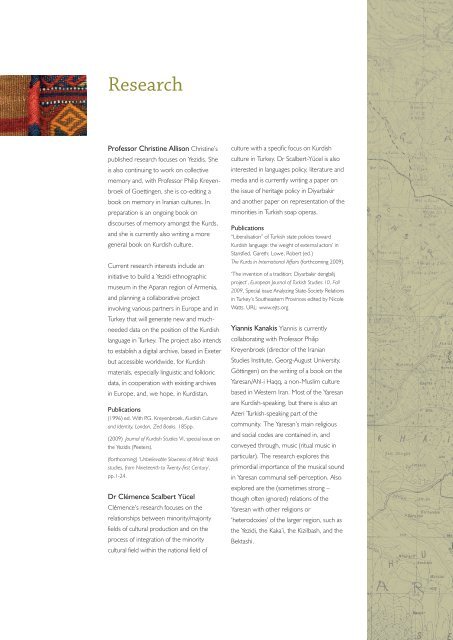Centre for Kurdish Studies - College of Social Sciences and ...
Centre for Kurdish Studies - College of Social Sciences and ...
Centre for Kurdish Studies - College of Social Sciences and ...
You also want an ePaper? Increase the reach of your titles
YUMPU automatically turns print PDFs into web optimized ePapers that Google loves.
Research<br />
Pr<strong>of</strong>essor Christine Allison Christine’s<br />
published research focuses on Yezidis. She<br />
is also continuing to work on collective<br />
memory <strong>and</strong>, with Pr<strong>of</strong>essor Philip Kreyenbroek<br />
<strong>of</strong> Goettingen, she is co-editing a<br />
book on memory in Iranian cultures. In<br />
preparation is an ongoing book on<br />
discourses <strong>of</strong> memory amongst the Kurds,<br />
<strong>and</strong> she is currently also writing a more<br />
general book on <strong>Kurdish</strong> culture.<br />
Current research interests include an<br />
initiative to build a Yezidi ethnographic<br />
museum in the Aparan region <strong>of</strong> Armenia,<br />
<strong>and</strong> planning a collaborative project<br />
involving various partners in Europe <strong>and</strong> in<br />
Turkey that will generate new <strong>and</strong> muchneeded<br />
data on the position <strong>of</strong> the <strong>Kurdish</strong><br />
language in Turkey. The project also intends<br />
to establish a digital archive, based in Exeter<br />
but accessible worldwide, <strong>for</strong> <strong>Kurdish</strong><br />
materials, especially linguistic <strong>and</strong> folkloric<br />
data, in cooperation with existing archives<br />
in Europe, <strong>and</strong>, we hope, in Kurdistan.<br />
Publications<br />
(1996) ed. With P.G. Kreyenbroek, <strong>Kurdish</strong> Culture<br />
<strong>and</strong> Identity, London, Zed Books. 185pp.<br />
(2009) Journal <strong>of</strong> <strong>Kurdish</strong> <strong>Studies</strong> VI, special issue on<br />
the Yezidis (Peeters).<br />
(<strong>for</strong>thcoming) ‘Unbelievable Slowness <strong>of</strong> Mind: Yezidi<br />
studies, from Nineteenth to Twenty-first Century’,<br />
pp.1-24.<br />
Dr Clémence Scalbert Yücel<br />
Clémence’s research focuses on the<br />
relationships between minority/majority<br />
fields <strong>of</strong> cultural production <strong>and</strong> on the<br />
process <strong>of</strong> integration <strong>of</strong> the minority<br />
cultural field within the national field <strong>of</strong><br />
culture with a specific focus on <strong>Kurdish</strong><br />
culture in Turkey. Dr Scalbert-Yücel is also<br />
interested in languages policy, literature <strong>and</strong><br />
media <strong>and</strong> is currently writing a paper on<br />
the issue <strong>of</strong> heritage policy in Diyarbakir<br />
<strong>and</strong> another paper on representation <strong>of</strong> the<br />
minorities in Turkish soap operas.<br />
Publications<br />
“Liberalisation” <strong>of</strong> Turkish state policies toward<br />
<strong>Kurdish</strong> language: the weight <strong>of</strong> external actors’ in<br />
Stansfied, Gareth; Lowe, Robert (ed.)<br />
The Kurds in International Affairs (<strong>for</strong>thcoming 2009).<br />
‘The invention <strong>of</strong> a tradition: Diyarbakir dengbêj<br />
project’, European Journal <strong>of</strong> Turkish <strong>Studies</strong> 10, Fall<br />
2009, Special issue Analyzing State-Society Relations<br />
in Turkey’s Southeastern Provinces edited by Nicole<br />
Watts. URL: www.ejts.org<br />
Yiannis Kanakis Yiannis is currently<br />
collaborating with Pr<strong>of</strong>essor Philip<br />
Kreyenbroek (director <strong>of</strong> the Iranian<br />
<strong>Studies</strong> Institute, Georg-August University,<br />
Göttingen) on the writing <strong>of</strong> a book on the<br />
Yaresan/Ahl-i Haqq, a non-Muslim culture<br />
based in Western Iran. Most <strong>of</strong> the Yaresan<br />
are <strong>Kurdish</strong>-speaking, but there is also an<br />
Azeri Turkish-speaking part <strong>of</strong> the<br />
community. The Yaresan’s main religious<br />
<strong>and</strong> social codes are contained in, <strong>and</strong><br />
conveyed through, music (ritual music in<br />
particular). The research explores this<br />
primordial importance <strong>of</strong> the musical sound<br />
in Yaresan communal self-perception. Also<br />
explored are the (sometimes strong –<br />
though <strong>of</strong>ten ignored) relations <strong>of</strong> the<br />
Yaresan with other religions or<br />
‘heterodoxies’ <strong>of</strong> the larger region, such as<br />
the Yezidi, the Kaka’i, the Kizilbash, <strong>and</strong> the<br />
Bektashi.

















